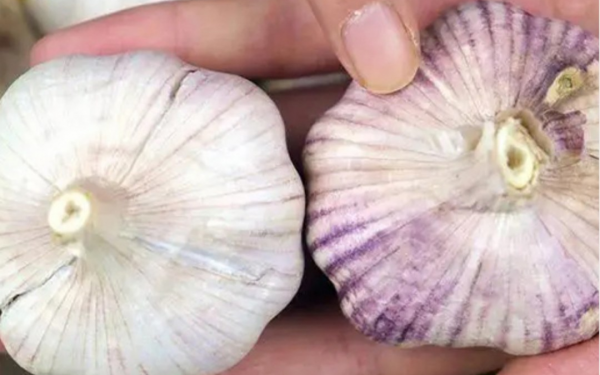

Should I Choose White or Purple Garlic?
Garlic is a well-known spice treasured in many kitchens for its unique ability to enhance flavors and provide health benefits, boosting our resistance against illnesses. Many homemakers know the importance of selecting fresh garlic to ensure high nutritional value and avoid the unpleasant mold or sprouting issue over time.
While shopping for garlic, you’ll often encounter two main types: white-skinned garlic and purple-skinned garlic. Let’s explore what sets these two apart.

The Key Differences Between White and Purple Garlic
White-skinned garlic is usually larger and has a crispy texture, making it a popular choice for those who enjoy a milder, less spicy garlic flavor. It’s particularly suitable for eating raw or when you want to add just a hint of garlic to salads and dressings. However, being watery and less spicy can sometimes mean these garlics have fewer nutrients compared to the purple-skinned variety.
On the other hand, purple-skinned garlic bulbs, which feature a lovely purple hue, are highly acclaimed for their rich taste and higher allicin content. These are generally spicier and more fragrant, making them perfect for cooking enthusiasts who appreciate depth in flavor.
Selecting the Best Garlic
No matter the type you choose, picking high-quality garlic is crucial. Here’s what you should focus on:
Checking the Garlic Head
Observe the head of the garlic bulb. After harvesting, the remaining stem can reveal a lot about its age. Use a knife to cut a small section off and examine the inside. If there are multiple layers, with no visible holes, it’s likely still young and was harvested too early. The more matured garlic has a more robust and delicious flavor.
Inspecting the Root
Good quality garlic should have some roots intact, helping it retain moisture. Garlic with roots will be plumper and have better-preserved nutrients compared to those with cut roots, which often dry out and shrivel quickly.
Evaluating the Skin
Not all white garlic is superior in taste. Often, a slightly purple or even entirely purple-skinned garlic is favored for its dynamic taste profile. Choose according to your flavor preference but remember that the purple variants tend to offer more in terms of taste.
Testing the Firmness
Gently press each bulb to ensure it’s fresh and firm. Fresh garlic is full and hard; while soft, easily indented bulbs indicate they may have been in storage too long and could be moldy or deteriorating inside. Avoid bulbs that show cracks, dents, or discoloration as these are signs of spoilage, making them difficult to preserve and potentially harmful if consumed.
Steer clear of garlic that seems ready to sprout. Although edible, its flavor diminishes, and its shelf life drastically drops, causing the cloves to become quickly deprived of texture and taste.
Để lại một phản hồi